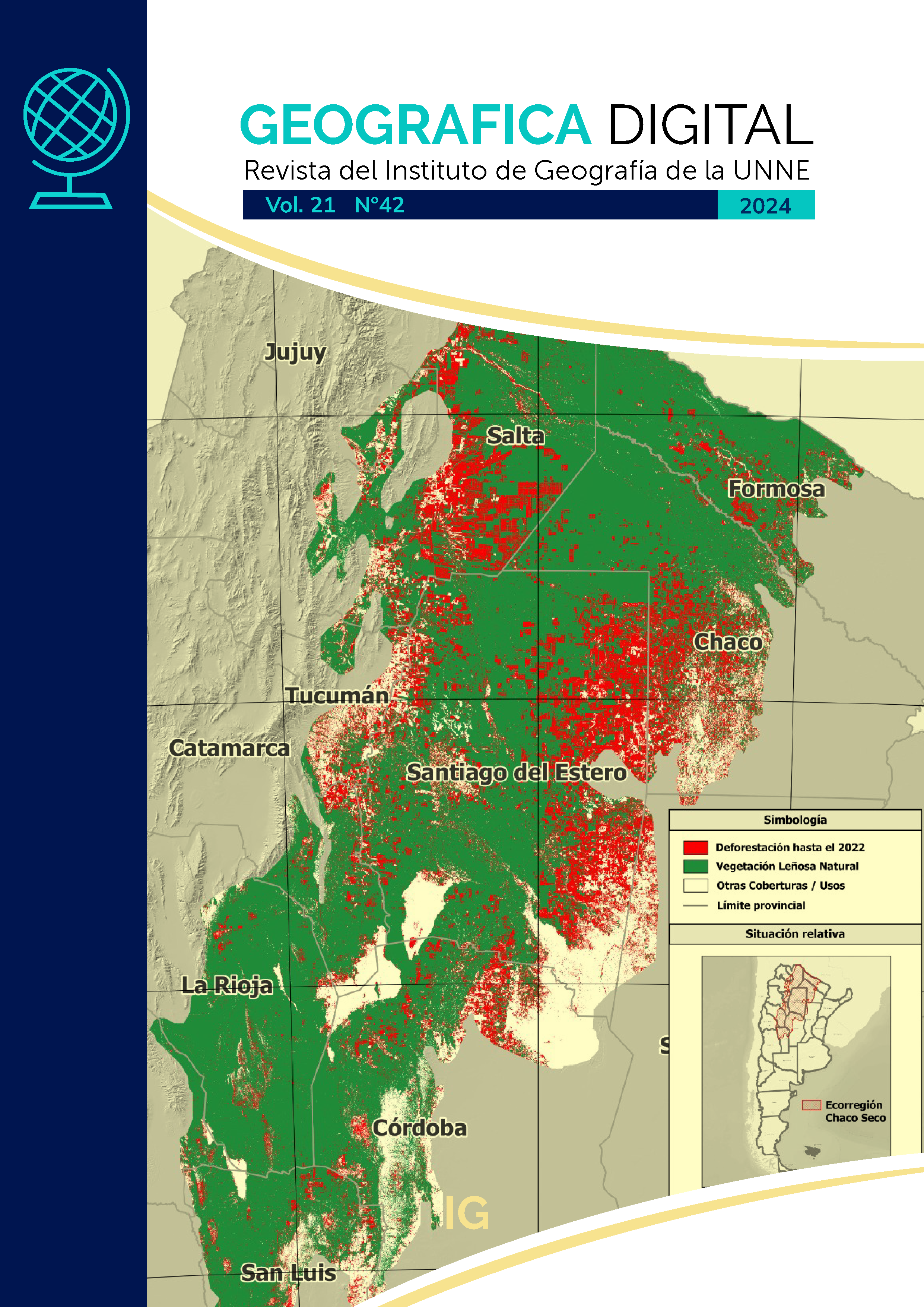Estrategias de Comunicación para el Cambio Climático en Argentina basadas en los sesgos cognitivos
DOI:
https://doi.org/10.30972/geo.21427618Palavras-chave:
Crisis climática , Divulgación , Sesgos Cognitivos , Toma de DecisionesResumo
El cambio climático es considerado una de las mayores amenazas dado que compromete a todos los ecosistemas y a la sostenibilidad de los recursos naturales. La problemática se presenta de manera mundial, pero no todas las localidades están expuestas a las mismas consecuencias. Dadas las repercusiones que presenta la problemática en Argentina, es de suma importancia para la ciencia el poder comunicar de una manera eficiente sus efectos sobre la población para que se tomen medidas para paliar los efectos negativos. Sin embargo, la forma de divulgación histórica no ha tenido en consideración la forma en la que los individuos procesan la información y toman decisiones en base a ello. Ya que estas últimas pueden basarse en procesamientos automáticos de la información, creencias previas o influencias culturales que constituyen sesgos en la manera de interpretarla. Por lo tanto, la presente reseña tuvo como objetivo analizar las formas de comunicación del cambio climático en la toma de conciencia de la población en Argentina.
Referências
Abbass, K., Qasim, M. Z., Song, H., Murshed, M., Mahmood, H. & Younis, I. (2022). A review of the global climate change impacts, adaptation, and sustainable mitigation measures. Environmental Science and Pollution Research, 29(28), 42539-42559. https://doi.org/10.1007/s11356-022-19718-6 DOI: https://doi.org/10.1007/s11356-022-19718-6
Alcañiz, I. & Gutierrez, R. A. (2020). Between the global commodity boom and subnational state capacities: payment for environmental services to fight deforestation in Argentina. Global Environmental Politics, 20(1), 38-59. https://doi.org/10.1162/glep_a_00535 DOI: https://doi.org/10.1162/glep_a_00535
Alexander, B. (2023). Universities on fire: higher education in the climate crisis. JHU Press. DOI: https://doi.org/10.56021/9781421446493
Andrade, V. S., Gutierrez, M. F., Regaldo, L., Paira, A. R., Repetti, M. R. & Gagneten, A. M. (2021). Influence of rainfall and seasonal crop practices on nutrient and pesticide runoff from soybean dominated agricultural areas in Pampean streams, Argentina. Science of the Total Environment, 788, 147676. https://doi.org/10.1016/j.scitotenv.2021.147676 DOI: https://doi.org/10.1016/j.scitotenv.2021.147676
Azzopardi, L. (2021). Cognitive biases in search: A review and reflection of cognitive biases in Information Retrieval. In Proceedings of the 2021 Conference on Human Information Interaction and Retrieval (pp. 27-37) doi:10.1145/3406522.3446023 DOI: https://doi.org/10.1145/3406522.3446023
Barros, V. R., Boninsegna, J. A., Camilloni, I. A., Chidiak, M., Magrín, G. O. & Rusticucci, M. (2014). Climate change in Argentina: trends, projections, impacts and adaptation. Wiley Interdisciplinary Reviews: Climate Change, 6(2), 151-169. https://doi.org/10.1002/wcc.316 DOI: https://doi.org/10.1002/wcc.316
Beck, H. E., Zimmermann, N. E., McVicar, T. R., Vergopolan, N., Berg, A. & Wood, E. F. (2018). Present and future Köppen-Geiger climate classification maps at 1-km resolution. Scientific data, 5(1), 1-12. https://doi.org/10.1038/sdata.2018.214 DOI: https://doi.org/10.1038/sdata.2018.214
Beron, J. C., Solovey, G., Ferrelli, I. A., Pedreira, M. E. y Fernández, R. S. (2024). Large environmental changes reduce valence-dependent belief updating. Sci Rep, 14(10429). https://doi.org/10.1038/s41598-024-61207-y DOI: https://doi.org/10.1038/s41598-024-61207-y
Bolin, J. L. & Hamilton, L. C. (2018). The News You Choose: news media preferences amplify views on climate change. Environmental Politics, 27(3), 455–476. https://doi.org/10.1080/09644016.2018.1423909 DOI: https://doi.org/10.1080/09644016.2018.1423909
Brendel, A. S., del Barrio, R. A., Mora, F., León, E. A. O., Flores, J. R. & Campoy, J. A. (2020). Current agro-climatic potential of Patagonia shaped by thermal and hydric patterns. Theoretical and Applied Climatology, 142, 855-868. https://doi.org/10.1007/s00704-020-03350-w DOI: https://doi.org/10.1007/s00704-020-03350-w
Carlson, J. M., Lehman, B. R. & Thompson, J. L. (2019) Climate change images produce an attentional bias associated with pro-environmental disposition. Cognitive Processing, 20, 385–390. https://doi.org/10.1007/s10339-019-00902-5 DOI: https://doi.org/10.1007/s10339-019-00902-5
Carlson, J. M., Kaull, H., Steinhauer, M., Zigarac, A. & Cammarata, J. (2020). Paying attention to climate change: Positive images of climate change solutions capture attention. Journal of Environmental Psychology, 71(101477). https://doi.org/10.1016/j.jenvp.2020.101477 DOI: https://doi.org/10.1016/j.jenvp.2020.101477
Carretero, S. C., Rapaglia, J. & Kruse, E. E. (2013). Análisis de la futura intrusión salina en un acuífero costero como respuesta al cambio climático: Partido de la Costa, provincia de Buenos Aires. Acta Geológica, 24(1-2), 34-40.
Coates, S. J. & Norton, S. A. (2021). The effects of climate change on infectious diseases with cutaneous manifestations. InternationalJjournal of Women's Dermatology, 7(1), 8-16. DOI: 10.1016/j.ijwd.2020.07.005 DOI: https://doi.org/10.1016/j.ijwd.2020.07.005
Congiu, L. & Moscati, I. (2021). A review of nudges: Definitions, justifications, effectiveness. Journal of Economic Surveys, 36(1), 188-213. https://doi.org/10.1111/joes.12453 DOI: https://doi.org/10.1111/joes.12453
del Barrio, R. A., Fernandez, E., Brendel, A. S., Whitney, C., Campoy, J. A. & Luedeling, E. (2020). Climate change impacts on agriculture's southern frontier–Perspectives for farming in North Patagonia. International Journal of Climatology, 41(1), 726-742. https://doi.org/10.1002/joc.6649
del Barrio, R. A., Fernandez, E., Brendel, A. S., Whitney, C., Campoy, J. A. & Luedeling, E. (2020). Climate change impacts on agriculture's southern frontier–Perspectives for farming in North Patagonia. International Journal of Climatology, 41(1), 726-742. https://doi.org/10.1002/joc.6649 DOI: https://doi.org/10.1002/joc.6649
Diggs, G. (2017). Evolutionary mismatch: implications far beyond diet and exercise. Journal of Evolution and Health, 2(1). https://doi.org/10.15310/2334-3591.1057. DOI: https://doi.org/10.15310/2334-3591.1057
Eigenauer, J. D. (2018). The problem with the problem of human irrationality. International Journal of Educational Reform, 27(4), 341-358. https://doi.org/10.1177/105678791802700402 DOI: https://doi.org/10.1177/105678791802700402
Fawzy, S., Osman, A. I., Doran, J. & Rooney, D. W. (2020). Strategies for mitigation of climate change: a review. Environmental Chemistry Letters, 18, 2069-2094. https://doi.org/10.1007/s10311-020-01059-w DOI: https://doi.org/10.1007/s10311-020-01059-w
Ferrelli, F., Brendel, A. S., Perillo, G. M. E. & Piccolo, M. C. (2021). Warming signals emerging from the analysis of daily changes in extreme temperature events over Pampas (Argentina). Environmental Earth Sciences, 80(12), 422. https://doi.org/10.1007/s12665-021-09721-4 DOI: https://doi.org/10.1007/s12665-021-09721-4
Ferrelli, F., Brendel, A. S. & Piccolo, M. C. (2022). Evaluación del reanalysis (NCEP/NCAR) para el estudio de la variabilidad termo-pluviométrica del noroeste argentino. Papeles de Geografía, (68), 26-39. https://doi.org/10.6018/geografia.524631 DOI: https://doi.org/10.6018/geografia.524631
Ferrelli, F., Pontrelli Albisetti, M., Brendel, A. S., Casoni, A. I. & Hesp, P. A. (2024a). Appraisal of Daily Temperature and Rainfall Events in the Context of Global Warming in South Australia. Water, 16(2), 351. https://doi.org/10.3390/w16020351 DOI: https://doi.org/10.3390/w16020351
Ferrelli, F., Brendel,. A. S., Mendioroz, P. & Ferrelli, I. A. (2024b) Reviewing the Heat: Exploring Global Warming Patterns in the Southern Hemisphere. Environmental Analysis & Ecology Studies (EAES), 2024(2), 1458 - 1467. https://crimsonpublishers.com/eaes/pdf/EAES.000789.pdf DOI: https://doi.org/10.31031/EAES.2024.12.000789
Frederick, S., Loewenstein, G., & O'Donoghue, T. (2002). Time discounting and time preference: A critical review. Journal of Economic Literature, 40(2), 351-401. /doi.org/10.1257/002205102320161311 DOI: https://doi.org/10.1257/jel.40.2.351
Gilbert, D. (3 de julio 2006). Humans wired to respond to short-term problems. NPR. https://www.npr.org/2006/07/03/5530483/humans-wired-to-respond-to-short-term-problems
Heine, S. J. (2020). Cultural psychology: Fourth international student edition. WW Norton & company.
Hennes, E. P., Ruisch, B. C., Feygina, I., Monteiro, C. A. & Jost, J. T. (2016). Motivated recall in the service of the economic system: The case of anthropogenic climate change. Journal of Experimental Psychology: General, 145(6), 755. https://doi.org/10.1037/xge0000148 DOI: https://doi.org/10.1037/xge0000148
Intergovernmental Panel on Climate Change (IPCC) (Ed.). (2023). Climate Change 2022 - Mitigation of Climate Change: Working Group III Contribution to the Sixth Assessment Report of the Intergovernmental Panel on Climate Change. Cambridge University Press DOI: https://doi.org/10.1017/9781009157926
Kahan D. M., Peters E., Dawson E. C. & Slovic P. (2017). Motivated numeracy and enlightened self-government. Behavioral Public Policy, 1(1), 54-86. doi:10.1017/bpp.2016.2 DOI: https://doi.org/10.1017/bpp.2016.2
Kahneman, D. (2011). Thinking Fast and Slow. Farrar, Straus and Giroux.
Korteling, J. E. & Toet, A. (2020). Cognitive biases. In S. Della Sala, Reference Module in Neuroscience and Biobehavioral Psychology (pp.610-619). Elsevier ScienceDirect doi.org/10.1016/B978-0-12-809324-5.24105-9
Kuzmanovic, B., Jefferson, A. & Vogeley, K. (2015). Self-specific optimism bias in belief updating is associated with high trait optimism. Journal of Behavioral Decision Making, 28, 281–293. https://doi.org/10.1002/bdm.1849 DOI: https://doi.org/10.1002/bdm.1849
Long, Q., Wang, F., Ge, W., Jiao, F., Han, J., Chen, H., Roig, F., Abraham, E., Xie, M. & Cai, L. (2023). Temporal and Spatial Change in Vegetation and Its Interaction with Climate Change in Argentina from 1982 to 2015. Remote Sensing, 15(7), 1926. https://doi.org/10.3390/rs15071926 DOI: https://doi.org/10.3390/rs15071926
Luo, Y. & Zhao, J. (2019). Motivated attention in climate change perception and action. Frontiers in psychology, 10(1541). https://doi.org/10.3389/fpsyg.2019.01541 DOI: https://doi.org/10.3389/fpsyg.2019.01541
Luo, Y. & Zhao, J. (2021). Attentional and perceptual biases of climate change. Current Opinion in Behavioral Sciences, 42, 22–26. https://doi.org/10.1016/j.cobeha.2021.02.010 DOI: https://doi.org/10.1016/j.cobeha.2021.02.010
Marshall, G. (2015). Don't even think about it: Why our brains are wired to ignore climate change. Bloomsbury Publishing USA.
Mellado, D., Giuliani, D., Demetrio, P. M., Sanchez, E. Y., Porta, A. & Lerner, J. E. C. (2022). Influence of vehicular emissions on the levels of polycyclic aromatic hydrocarbons (PAHs) in urban and industrial areas of La Plata, Argentina. Environmental monitoring and assessment, 194(11), 822. https://doi.org/10.1007/s10661-022-10496-9 DOI: https://doi.org/10.1007/s10661-022-10496-9
Moser, D., Steiglechner, P. & Schlüter, A. (2022). Facing global environmental change: The role of culturally embedded cognitive biases. Environmental Development, 44, 100735. https://doi.org/10.1016/j.envdev.2022.100735 DOI: https://doi.org/10.1016/j.envdev.2022.100735
Newell, B. R., Kary, A., Moore, C., & Gonzalez, C. (2015). Managing the Budget: Stock-Flow Reasoning and the CO2 Accumulation Problem. Topics in Cognitive Science, 8(1), 138–159. https://doi.org/10.1111/tops.12176 DOI: https://doi.org/10.1111/tops.12176
Nurse, M. S. & Grant, W. J. (2019). I’ll See It When I Believe It: Motivated Numeracy in Perceptions of Climate Change Risk*. Environmental Communication, 14(2), 184–201. https://doi.org/10.1080/17524032.2019.1618364 DOI: https://doi.org/10.1080/17524032.2019.1618364
Peters, U. (2022). What Is the Function of Confirmation Bias? Erkenn, 87, 1351–1376 https://doi.org/10.1007/s10670-020-00252-1 DOI: https://doi.org/10.1007/s10670-020-00252-1
Pinsky, E., Guerrero, A. P. & Livingston, R. (2020). Our House Is on Fire: Child and Adolescent Psychiatrists in the Era of the Climate Crisis. Journal of the American Academy of Child and Adolescent Psychiatry, 59(5), 580-582. doi: 10.1016/j.jaac.2020.01.016 DOI: https://doi.org/10.1016/j.jaac.2020.01.016
Ranney, M. A. & Clark, D. (2016). Climate Change Conceptual Change: Scientific Information Can Transform Attitudes. Topics in Cognitive Science, 8(1), 49–75. doi: 10.1111/tops.12187 DOI: https://doi.org/10.1111/tops.12187
Risen, J. L. (2015). Believing what we do not believe: Acquiescence to superstitious beliefs and other powerful intuitions. Psychological Review, 123(2), 128-207. doi: 10.1037/rev0000017 DOI: https://doi.org/10.1037/rev0000017
Sharot, T. & Garrett, N. (2016). Forming beliefs: Why valence matters. Trends Cognitive. Sciences, 20(1), 25–33. https://doi.org/10.1016/j.tics.2015.11.002 DOI: https://doi.org/10.1016/j.tics.2015.11.002
Shi, J., Visschers, V., Siegrist, M. & Arvai, J. (2016). Knowledge as a driver of public perceptions about climate change reassessed. Nature Clim Change, 6, 759–762. https://doi.org/10.1038/nclimate2997 DOI: https://doi.org/10.1038/nclimate2997
Tversky, A. y Kahneman, D. (1973). Availability: A heuristic for judging frequency and bability. Cognitive Psychology, 5(2), 207-232. https://doi.org/10.1016/0010-0285(73)90033-9 DOI: https://doi.org/10.1016/0010-0285(73)90033-9
Tversky, A., Kahneman, D. (1981). The framing of decisions and the psychology of choice. Science, 211(4481), 453-458. doi: 10.1126/science.7455683 DOI: https://doi.org/10.1126/science.7455683
Van der Linden, S. (2015). The social-psychological determinants of climate change risk perceptions: Towards a comprehensive model. Journal of Environmental Psychology, 41, 112–124. https://doi.org/10.1016/j.jenvp.2014.11.012 DOI: https://doi.org/10.1016/j.jenvp.2014.11.012
van Leeuwen, C., Sgubin, G., Bois, B., Ollat, N., Swingedouw, D., Zito, S. & Gambetta, G. A. (2024). Climate change impacts and adaptations of wine production. Nature Reviews Earth & Environment, 5(4), 258-275. https://doi.org/10.1038/s43017-024-00521-5 DOI: https://doi.org/10.1038/s43017-024-00521-5
Vega, E., Bastidas Navarro, M., Martyniuk, N., Balseiro, E. & Modenutti, B. (2023). Glacial recession in Andean North-Patagonia (Argentina): microbial communities in benthic biofilms of glacier-fed streams. Hydrobiologia, 850(18), 3965-3979. https://doi.org/10.1007/s10750-023-05279-3 DOI: https://doi.org/10.1007/s10750-023-05279-3
Woolway, R. I., Kraemer, B. M., Lenters, J. D., Merchant, C. J., O’Reilly, C. M. & Sharma, S. (2020). Global lake responses to climate change. Nature Reviews Earth & Environment, 1(8), 388-403. https://doi.org/10.1038/s43017-020-0067-5 DOI: https://doi.org/10.1038/s43017-020-0067-5
Downloads
Publicado
Como Citar
Edição
Seção
Licença
Copyright (c) 2024 Geográfica digital

Este trabalho está licenciado sob uma licença Creative Commons Attribution-NonCommercial 4.0 International License.


















